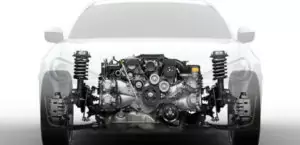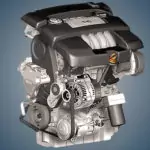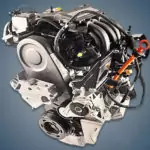The 2.0-liter 8-valve Volkswagen BMM 2.0 TDI engine was produced from 2004 to 2010 and was installed on many models of the concern with a transverse power unit. This diesel engine is known for its whimsical piezoelectric unit injectors.
The EA188-2.0 series also includes: BKD, BKP, BMM, BMP, BMR, BPW, BRE, BRT.
Specifications
| Production years | 2004-2010 |
| Displacement, cc | 1968 |
| Fuel system | unit-injectors |
| Power output, hp | 140 |
| Torque output, Nm | 320 |
| Cylinder block | cast iron R4 |
| Block head | aluminum 8v |
| Cylinder bore, mm | 81 |
| Piston stroke, mm | 95.5 |
| Compression ratio | 18.5 |
| Features | SOHC |
| Hydraulic lifters | yes |
| Timing drive | belt |
| Phase regulator | no |
| Turbocharging | VGT |
| Recommended engine oil | 5W-30 |
| Engine oil capacity, liter | 4.3 |
| Fuel type | diesel |
| Euro standards | EURO 4 |
| Fuel consumption, L/100 km (for Volkswagen Golf 2005) — city — highway — combined |
7.0 4.9 5.7 |
| Engine lifespan, km | ~280 000 |
| Weight, kg | 178 |
The engine was installed on:
- Audi A3 2 (8P) in 2005 – 2006;
- Skoda Octavia 2 (1Z) in 2005 – 2010;
- Seat Altea 1 (5P) in 2005 – 2010;
- Seat Leon 2 (1P) in 2005 – 2010;
- Volkswagen Caddy 3 (2K) in 2007 – 2010;
- Volkswagen Golf 5 (1K) in 2004 – 2008;
- Volkswagen Golf Plus 1 (5M) in 2005 – 2008;
- Volkswagen Jetta 5 (1K) in 2006 – 2008;
- Volkswagen Touran 1 (1T) in 2005 – 2010.
Disadvantages of the VW BMM engine
- A lot of diesel problems are due to the vagaries of its piezoelectric unit injectors.
- In second place are dips in thrust due to pollution and wedge geometry of the turbine.
- The reason for the increase in oil level is usually a loosening of the fastening of the unit injectors.
- Also, the seal of the tandem pump may suffer from a lack of tightness here.
- On runs over 200 thousand km, the particulate filter is often completely clogged.






